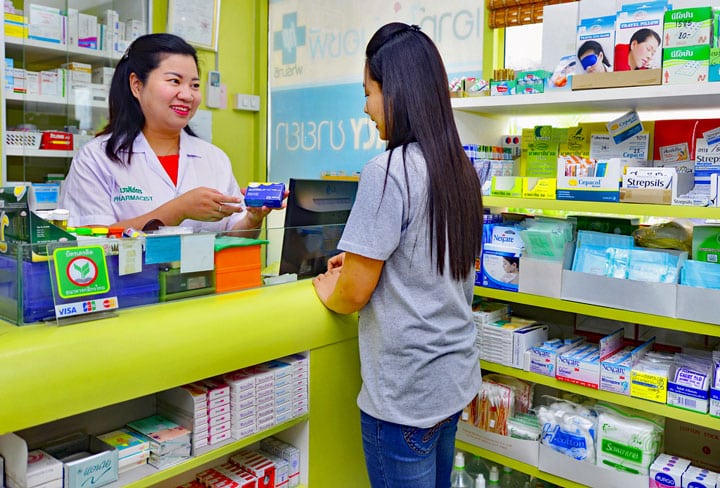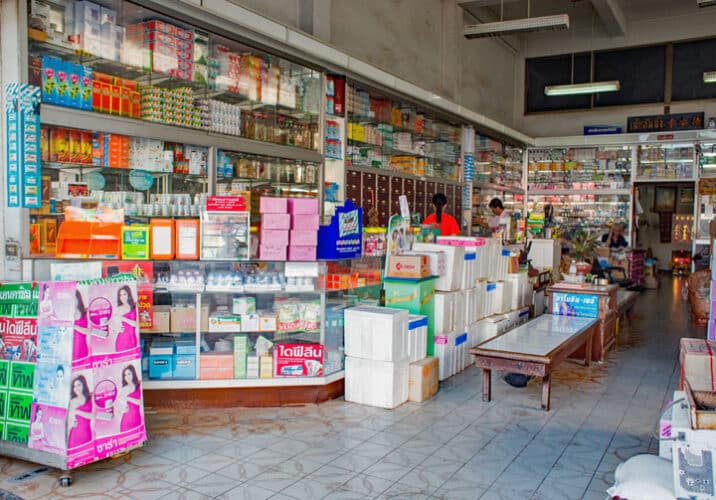The Thai pharmaceutical industry

(iviewfinder / Shutterstock.com)
Have you ever been to a country where there are more pharmacies and drug stores than in Thailand? Even in the smallest hamlet you can find a kind of Winkel van Sinkel that sells an assortment of medicines in addition to daily necessities.
It almost seems that the general health of the ภาษาไทย leaves much to be desired so thick are the outlets for pills, potions and ointments against all kinds of ailments. Guaranteed that if you go to the doctor for the slightest problem, you will leave with bags full of pills. Headache, pain here, pain there, the pill brings a solution. Airways a bit clogged? Small bottles with a liquid for inhalation are widely available. Everywhere you see the Thai snorting.
Recipe and price
Everything is available without a prescription and at considerably lower prices than in your own country. The fact that the prices of medicines have fallen drastically in the Netherlands as a result of the intervention of the insurance companies indicates how high the profitability has always been. However, the Thai pharmaceutical world is now also starting to complain because there are privateers on the coast who are starting to penetrate and put pressure on prices.

Tek Un Tung Traditional Drug Store (Settawat Udom / Shutterstock.com)
Foreign influences
The turnover of the Thai pharmaceutical industry amounts to approximately two and a half billion euros on an annual basis, and China and India in particular are shooting at the interesting sizeable Thai market with cheaper medicines. It is cheaper for the local industry to import ready-made medicines from these countries than the necessary raw materials and active ingredients. Let alone making it yourself. The fact is that within a few years, imported medicines have acquired a market share of 20 percent from scratch. According to insiders, that share will even rise quickly given that production costs are in Thailand 20 to 30 percent higher than in the countries mentioned.
Safe medicines
The Thai industry uses the safety aspect as a defense, but how safe are its own medicines and what control does the government really exercise? Of the large number of Thai pharmaceutical companies, only the Biopharm company is certified and government control is a joke. Take a stroll through the market stalls on Sukhumvit Road in Bangkok. You will not find headache powders there, but you will find all well-known brands that help to enhance male lust. Only available on prescription in almost all countries, but offered here through the market stalls for a fraction of the official price charged by Cialis, Viagra and all other brands. Brand counterfeit? Perhaps, but still….
– Reposted message –


My very first comment concerns the storage method that is apparently not respected, where the temperature limits for storage are stated on the package insert …… this is usually up to a maximum of 30 degrees Celsius ..... what about the many open (so no AC) pharmacy stores …. especially at the village level…?.
So I buy my medication at the Tesco / Big C extra / Centrals pharmacies because the air conditioning is running happily there …
In the Isan village where I live, a pickup with speaker installation comes by once every 2 weeks. The little man in it loudly praises the goods. Sometimes also indicates promotions or promotions. It doesn't make me happy. Check? Never heard of it. Deduction from the villagers is reasonable, because if you don't have a moped it's easy.
The information given is not correct in all cases, just try to get a solid sleeping pill in a pharmacy, then you will usually be referred to a hospital anyway. Last week in one of the larger pharmacies in Silom I was even refused prednisone, I was advised to go to a hospital.
The fact that prices in Thailand are lower is also not always true, 2 random examples:
Telmisartan 40 mg 90 pieces, in the Netherlands via health insurance for 11,41 Euro (including pharmacy delivery costs), in Thailand under the name Micardis in a hospital, more than 2400 bath (approx. 65 Euro), Silom pharmacy 1650 bath (approx. 45 Euro )
Alendronic acid 70 mg 12 pieces, in the Netherlands via health insurance for 7,98 Euro (including pharmacy delivery costs), in Thailand under the name Fosamax in a hospital more than 6000 bath (approx. 160 Euro), Silom pharmacy 4100 bath (110 Euro) later I discovered a cheaper type from producer Sandoz for 2250 bath(60 Euro)
In addition to Biofarm, The Government Pharmaceutical Organization (GPO) also produces medicines in 2 factories, which are supplied cheaply. The GPO has 10 pharmacies in Bangkok, but the range is usually limited there. A not inconsiderable part of the production is exported. Another large (certified) Thai producer is Berlin. This company makes Miracid, one of the most commonly used stomach protectors in Thailand.
Finally, I can unfortunately not give a price comparison for Viagra and similar products, but I do wonder how stupid you are if you buy these products from a market stall.
hospitals are always expensive when it comes to medicines. Sometimes even 10 times as much.
Medicines imported from Europe are always more expensive due to the import tax.
In the village where I live, the medicines at the local hospital are cheaper than here at the pharmacy, but before you get the medicine you will first have to have a consultation with the doctor on duty before you are eligible for medicines, which sometimes means hours outside spend in the waiting room, that's why I prefer to go to a pharmacy, is a bit more expensive but you don't have to wait for hours, just yesterday, sent my wife for a medicine (dicloxacillin) to the village pharmacy, 20 capsules for 200 Baht, have previously in the hospital for the same amount of medicine to pay 170 Baht.
Means such as Viagra, etc. are now also available, which do not involve copying, namely “Sidegra” and this is also produced by GPO and has a fixed selling price of 180THB for 4x100mG, so you do not need a copy, with all the associated risks. to buy.
Yet another example of a GPO anti-HIV drug, “GPO-VIR” 60 tablets for about $25, get there in Holland for a €800 for 30 tablets. I do understand that this is a means that fortunately not everyone is waiting for, but I just want to indicate that it can be done cheaply,
and certified.
Did you go to a private hospital or a state hospital for those medicines?
That can make a world of difference.
Private hospitals are shockingly expensive with medicines.
Your reasoning "via health insurance" is not comparable, you pay for that.
If you want to make a realistic comparison, you should take the Belgian prices without health insurance and you will see that they are very expensive.
My question: how do you recognize a pharmacy in Thailand where no counterfeit is sold. I ask that question because I saw the program on TV about medicine in the Philippines. they seem genuine, but many are counterfeit and of poor quality. Import from China.
https://www.bnnvara.nl/kassa/artikelen/zembla-nog-jaren-medicijntekorten-door-coronacrisis
Many medicines also come from China and India in the Netherlands.
The Dutch pharmaceutical industry cannot compete with China and India in terms of price.
In Bangkok there is a very good pharmacy opposite the MBK. It is part of Chulalongkorn University. It's next to Phayathai soi 64.
Very reliable
The fact is, it can be cheap and easily available, but you have to be careful with it. For stomach problems I regularly used Norfloxacin, also available for a ridiculously low price at the local pharmacy.
When I once made this known to the GP in the Netherlands, I did receive a reprimand saying that the drug was only prescribed if other medicines did not work well and it was stated that this and many other drugs can become resistant with frequent use .
It is also known that a course of treatment is prescribed with certain medicines, also to prevent resistance.
Are the saleswomen also trained as pharmacists? Are they medically trained?
I'm curious because there are so many.
A trained pharmacist is necessary for the sale of “heavier” medicines. If all goes well, there will be a photo of the person in the case. IF he/she is not present, the sale may not take place.
Occasionally it does, especially if you come to that store more often and they know you
This is not necessary for home garden and kitchen medicines
I usually buy my medication from Boots or Tesco. Both have trained personnel. I never buy from Thai pharmacies. Done once and the pills were laid loose on the counter and slid into a jar with bare hands.
also at Boots and Tesco there is no guarantee that the drug is approved in Europe.
Furthermore, the employees do not know your medical background and they do not know which conditions you have had in the past that could influence the choice of the medicine.
Perhaps it is best to write down the ingredients on the packaging and discuss them online with your own doctor.
From my own experience I have experienced that even at the slightest inconvenience, the Thai go to these 'pharmacies' and get all sorts of stuff.
It seems as if the more pills one has to take, the better.
Maybe they're watching the program: mass is cash.
But indeed often 5 different medicines in plastic bags.
It does state on the etiquettes what kind of medicines it concerns.
There are often vitamin pills and sometimes brightly colored pink colors.
The Thai indeed swallows pills as if they were sweets
Self-appointed doctors are also walking around in the countryside, who make injections, with a substance that they buy themselves somewhere.
I think for whom health is important, a visit to a hospital is recommended, and not at the first pharmacy / drugstore / convenience store.
If you don't have one in the village where you live, take the bus.
With minor discomfort, most Thai people do not go to a doctor, there are no general practitioners here in Thailand and for something small you do not wait half a day in the hospital if you can also buy advice and medicines that help at the local shop. logically all right and it is certainly arranged with permits and trained people in the pharmacies. that there is a car going around with home remedies is a gap in the market and sometimes people benefit from it, don't think it's something to get very worried about. In terms of hygiene, it is usually really good, use the intended pill catcher and spatula, goes in a neat bag closed with a zip system, neat anyway. Sincerely. Jan.
in the ordinary small pharmacies, 75% are copies of medicines from India or China…